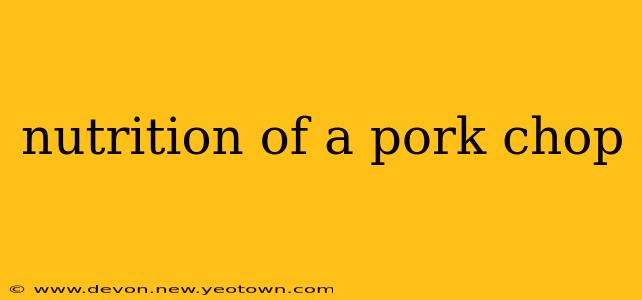The humble pork chop. It's a culinary staple, a comforting classic, and often the star of family dinners. But beyond its delicious taste and satisfying texture lies a nutritional profile worth exploring. Let's delve into the world of pork chop nutrition, uncovering its benefits and addressing common concerns.
What are the nutritional benefits of pork chops?
Pork chops, particularly those leaner cuts, are a surprisingly good source of several essential nutrients. Think of them as a powerhouse of protein, offering a significant contribution to your daily intake. This protein is vital for building and repairing tissues, making it crucial for muscle growth, immune function, and overall health. But the benefits don't stop there. A serving of pork chop also delivers a dose of essential vitamins and minerals, including:
- Niacin (B3): Crucial for energy metabolism and healthy skin.
- Thiamin (B1): Important for nerve function and carbohydrate metabolism.
- Vitamin B6: Plays a role in brain development and immune function.
- Selenium: A powerful antioxidant that protects cells from damage.
- Phosphorus: Essential for bone health and energy production.
- Zinc: Supports immune function and wound healing.
How many calories are in a pork chop?
The calorie count in a pork chop varies significantly depending on the cut, size, and cooking method. A 3-ounce (85-gram) serving of lean pork chop can range from approximately 150 to 200 calories. However, fattier cuts and preparation methods that involve added fats (like deep-frying) will naturally increase the calorie count. Choosing leaner cuts and opting for healthier cooking methods like grilling, baking, or broiling can help keep the calorie content in check.
Are pork chops good for weight loss?
This is a question that often sparks debate. While pork chops aren't inherently "bad" for weight loss, mindful consumption is key. Opting for lean cuts and controlling portion sizes is crucial. Incorporating a pork chop into a balanced diet rich in fruits, vegetables, and whole grains can be part of a successful weight loss plan. Remember, the overall dietary pattern matters more than focusing on individual foods.
What are the health risks associated with eating pork chops?
Like any food, there are potential health considerations to keep in mind. The primary concern revolves around the fat content. Heavily marbled cuts of pork chops can be high in saturated fat, which, if consumed excessively, can contribute to high cholesterol and heart disease. However, choosing leaner cuts and trimming visible fat before cooking can significantly mitigate this risk. Additionally, proper cooking is vital to eliminate any potential bacterial contamination.
Are pork chops high in cholesterol?
The cholesterol content in pork chops is a common concern. While pork chops do contain cholesterol, the amount varies depending on the cut. Leaner cuts generally contain less cholesterol than fattier options. However, it's important to remember that dietary cholesterol's impact on blood cholesterol levels is less significant than previously thought. Focusing on reducing saturated and trans fat intake remains a more impactful strategy for managing cholesterol levels.
What are some healthy ways to cook pork chops?
The way you cook your pork chop dramatically impacts its nutritional profile. Baking, grilling, broiling, or pan-frying with a minimal amount of oil are all healthier alternatives to deep-frying. Marinating your pork chop before cooking can also add flavor and tenderness while potentially reducing the need for added fats. Experiment with herbs, spices, and citrus juices to create flavorful and healthy meals.
The journey of a pork chop from farm to table is one of culinary delight and nutritional value. By making informed choices regarding the cut, cooking method, and portion size, you can enjoy this delicious protein while reaping its nutritional benefits. Remember, balance and moderation are key to a healthy and enjoyable diet.

